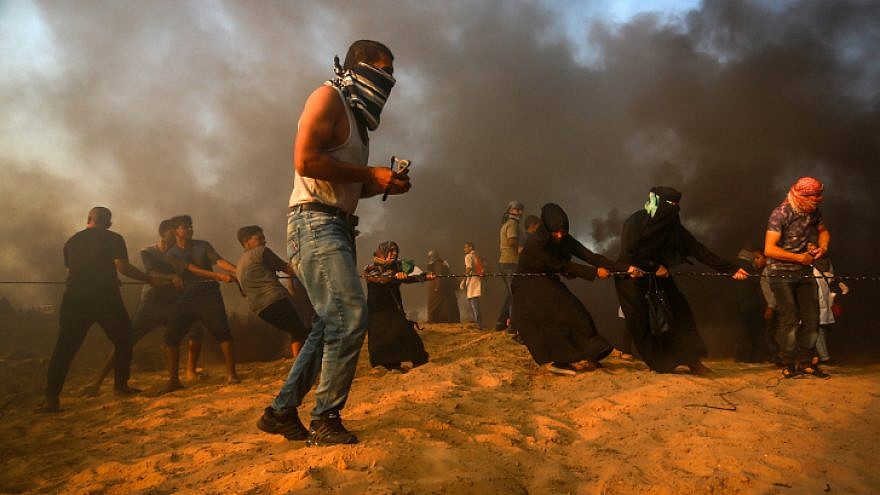Hamas, the rulers of the Gaza Strip, and Palestinian terrorist group Islamic Jihad both were quick to deny launching rockets from Gaza on Wednesday, after a Grad rocket fired on Israel scored a direct hit on a Beersheva home and another landed in the sea, off the coast of a major central Israeli city.
Six people, including a woman and her three children, managed to survive the Beersheva rocket attack with only minor injuries. In response, Israeli fighter jets struck 20 Hamas positions in Gaza, and the flare-up sparked concerns that a rapid escalation may be inevitable.
It would be a “very big mistake,” he warned, if Israel were to “fall into the Iranian trap and launch a military operation in Gaza. That would play directly into the Iranians’ hands.”
Yoni Ben-Menachem, a research fellow at the Jerusalem Center for Public Affairs, disagrees. Ben-Menachem argues that Wednesday’s rocket fire was Hamas’s handiwork, as Gaza’s rulers sought to set facts on the ground vis-à-vis Israel and Egypt.
“No other group in Gaza would dare fire two long-range rockets at Israel like this. The attack didn’t target the Gaza-vicinity communities; this was aimed at Beersheva and central Israel,” he said.
Had both projectiles resulted in Israeli fatalities, it would surely lead to war, he explained, adding that “no rogue group in Gaza would do something like that without getting the green light from Hamas. This is why, as the sovereign entity in Gaza, Hamas is responsible.”
“Hamas continues to claim that a rogue group was behind the attack only so it can deflect the claims brought against it, but it’s a lie. Unfortunately, the Israeli defense establishment seems to be willing to believe this lie,” said Ben-Menachem.
As for the timing of the attack, Ben-Menachem pegs it on the arrival of Egyptian intelligence officials in Gaza as part of Cairo’s attempts to broker a long-term cease-fire agreement between Israel and Hamas.
“Be very careful in romanticizing the relations between Hamas and Egypt because Hamas is very displeased with the way Egyptian intelligence is handling the truce talks,” he said.
“Hamas is actually sending mixed signals: Its message to Egypt is that it is dissatisfied with the way the negotiations are being handled, while at the same time, it signals to Israel that any forceful strike in Gaza would risk massive retaliation targeting the Israeli homefront,” he explained.
“Hamas maintains an iron grip on Gaza. It controls everything, down to the last firebomb balloon, so even if they say, ‘We didn’t do it,’ they did,” he said. “I can only assume that Israeli intelligence misjudged the situation and was unprepared for long-range rocket fire on Israel. That’s a failure on their part. We can’t trust Hamas, so we have to be prepared for any scenario.”
‘These radicals have nothing to lose’
Bar-Ilan University Middle Eastern Studies Department’s Dr. Yehuda Balanga, an expert on Syria and Egypt, believes there are other parties in Gaza who wish to capitalize on Israel and Egypt’s obvious interest in a Gaza truce.
“Hamas may be the sovereign in Gaza, but there are more radical forces on the ground, and while Hamas tries to rein them in, these organizations have their own agenda, and they see every attack on Israel as a great victory,” he said.
These groups, he explained, “understand that given the tensions in [Israel’s] northern sector and the fact that this is an election year, Israel won’t strike back.”
“For these groups, any rocket fired from Gaza is an achievement because it does not endanger them. They know Israel will not pursue the end of Hamas’s regime, nor will it pursue their elimination so as far as these groups are concerned, they are the winners here.”
These groups, said Balanga, “have their own agenda, and part of it is to embarrass Hamas. The fact that the head of Egyptian intelligence was headed to the Strip to try and advance the truce efforts made it the perfect time for them to act.”
“Everyone knows that despite the attempts to postpone the inevitable, Israel will eventually launch another military campaign in Gaza,” he said. “This means that these radicals have nothing to lose. Whatever the scenario, they will survive and will most likely be hailed as heroes by the Gazans. That’s why they fire rockets.”


























